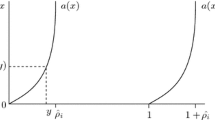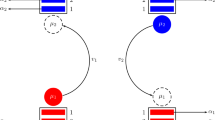Abstract
In this paper we introduce and analyze a new class of service policies called multi-phase gated service. This policy is a generalization of the classical single-phase and two-phase gated policies and works as follows. Each customer that arrives at queue i will have to wait K i ≥1 cycles before it receives service. The aim of this policy is to provide an interleaving scheme to avoid monopolization of the system by heavily loaded queues, by choosing the proper values of interleaving levels K i . In this paper, we analyze the effectiveness of the interleaving scheme on the queueing behavior of the system, and consider the problem of identifying the proper combination of interleaving levels \({\underline{K}}^{*}=(K_{1}^{*},\ldots,K_{N}^{*})\) that minimizes a weighted sum of the mean waiting times at each of the N queues. Obviously, the proper choice of the interleaving levels is most critical when the system is heavily loaded. For this reason, we explore the framework developed in Queueing Syst. 57, 29–46 (2007) to obtain closed-form expressions for the asymptotic waiting-time distributions in heavy traffic, and use these expressions to derive simple heuristics for approximating the optimal interleaving scheme \({\underline{K}}^{*}\). Numerical results with simulations demonstrate that the accuracy of these approximations is extremely high.
Similar content being viewed by others
References
Abate, J., & Whitt, W. (1992). The Fourier-series method for inverting transforms of probability distributions. Queueing Systems, 10, 5–88.
Athreya, K. B., & Ney, P. E. (1972). Branching processes. Berlin: Springer.
Blanc, J. P. C., & Van der Mei, R. D. (1995). Optimization of polling systems with Bernoulli schedules. Performance Evaluation, 2, 139–158.
Boon, M. A. A., Van der Mei, R. D., & Winands, E. M. M. (2011). Applications of polling systems. Surveys in Operations Research and Management Science, 16, 67–82.
Borst, S. C., & Boxma, O. J. (1997). Polling models with and without switchover times. Operations Research, 45, 536–543.
Borst, S. C., Boxma, O. J., & Levy, H. (1995). The use of service limits for efficient operation of multistation single-medium communication systems. IEEE/ACM Transactions on Networking, 3, 602–612.
Boxma, O. J., & Groenendijk, W. P. (1987). Pseudo-conservation laws in cyclic-service systems. Journal of Applied Probability, 24, 949–964.
Boxma, O. J., Levy, H., & Weststrate, J. A. (1993). Efficient visit frequencies for polling tables: minimization of waiting cost. Queueing Systems, 9, 133–162.
Choudhury, G. L., & Whitt, W. (1996). Computing transient and steady state distributions in polling models by numerical transform inversion. Performance Evaluation, 25, 267–292.
Coffman, E. G., Puhalskii, A. A., & Reiman, M. I. (1995). Polling systems with zero switch-over times: a heavy-traffic principle. The Annals of Applied Probability, 5, 681–719.
Coffman, E. G., Puhalskii, A. A., & Reiman, M. I. (1998). Polling systems in heavy-traffic: a Bessel process limit. Mathematics of Operations Research, 23, 257–304.
Fricker, C., & Jaïbi, M. R. (1994). Monotonicity and stability of periodic polling models. Queueing Systems, 15, 211–238.
Groenendijk, W. P. (1989). Waiting-time approximations for cyclic-service systems with mixed service strategies. Proceedings ITC, 12, 1434–1441.
Konheim, A. G., Levy, H., & Srinivasan, M. M. (1994). Descendant set: an efficient approach for the analysis of polling systems. IEEE Transactions on Communications, 42, 1245–1253.
Kramer, G., Muckerjee, B., & Pesavento, G. (2001). Ethernet PON: design and analysis of an optical access network. Photonic Network Communications, 3, 307–319.
Kramer, G., Muckerjee, B., & Pesavento, G. (2002a). Interleaved polling with adaptive cycle time (IPACT): a dynamic bandwidth allocation scheme in an optical access network. Photonic Network Communications, 4, 89–107.
Kramer, G., Muckerjee, B., & Pesavento, G. (2002b). Supporting differentiated classes of services in Ethernet passive optical networks. The Journal of Optical Networking, 1, 280–290.
Olsen, T. L., & Van der Mei, R. D. (2003). Polling systems with periodic server routeing in heavy-traffic: distribution of the delay. Journal of Applied Probability, 40, 305–326.
Olsen, T. L., & Van der Mei, R. D. (2005). Polling systems with periodic server routing in heavy traffic—renewal arrivals. Operations Research Letters, 33, 17–25.
Park, C. G., Han, D. H., Kim, B., & Jun, H.-S. (2005). Queueing analysis of symmetric polling algorithm for DBA scheme in an EPON. In B. D. Choi (Ed.), Proc. Korea-Netherlands joint conference on queueing theory and its applications to telecommunication systems, Seoul, June 22–25 (pp. 147–154).
Quine, M. P. (1972). The multitype Galton-Watson process with ρ near 1. Advances in Applied Probability, 4, 429–452.
Resing, J. A. C. (1993). Polling systems and multitype branching processes. Queueing Systems, 13, 409–426.
Takagi, H. (1986). Analysis of polling systems. Cambridge: MIT Press.
Van der Mei, R. D. (1999). Distribution of the delay in polling systems in heavy traffic. Performance Evaluation, 31, 163–182.
Van der Mei, R. D. (2000). Polling systems with switch-over times under heavy load: moments of the delay. Queueing Systems, 36, 381–404.
Van der Mei, R. D. (2007). Towards a unifying theory on branching-type polling models in heavy traffic. Queueing Systems, 57, 29–46.
Van der Mei, R. D., & Levy, H. (1997). Polling systems in heavy traffic: exhaustiveness of the service disciplines. Queueing Systems, 27, 227–250.
Van der Mei, R. D., & Resing, J. A. C. (2008). Polling models with two-phase gated service: heavy-traffic results for the waiting-time distributions. Probability in the Engineering and Informational Sciences, 22, 623–651.
Van der Mei, R. D., & Winands, E. M. M. (2007). Polling models with renewal arrivals: a new method to derive heavy-traffic asymptotics. Performance Evaluation, 64, 1029–1040.
Van der Mei, R. D., & Winands, E. M. M. (2008). A note on polling models with renewal arrivals and nonzero switch-over times. Operations Research Letters, 36, 500–505.
Vishnevskii, V. M., & Semenova, O. V. (2006). Mathematical methods to study the polling systems. Automation and Remote Control, 67, 173–220.
Author information
Authors and Affiliations
Corresponding author
Rights and permissions
About this article
Cite this article
van der Mei, R.D., Roubos, A. Polling models with multi-phase gated service. Ann Oper Res 198, 25–56 (2012). https://doi.org/10.1007/s10479-011-0921-4
Published:
Issue Date:
DOI: https://doi.org/10.1007/s10479-011-0921-4




